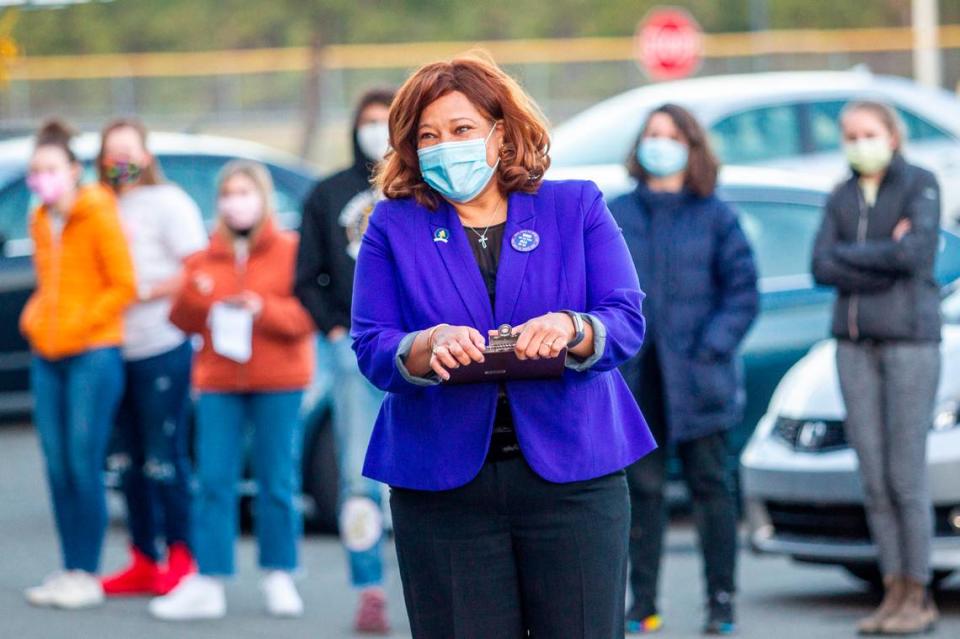Erica Smith lost badly in her first run for Senate. Why she thinks 2022 is different.
It was just a year ago that Erica Smith lost her bid for the Democratic nomination for U.S. Senate. Of course, it was a year that felt at times like a decade.
That was before the coronavirus pandemic, before the killings of several Black Americans led to a summer and more of social unrest and ongoing racial reckoning, before the male Democrat who had defeated Smith saddled himself with a sex scandal and lost in the general election, before a Black clergy member won a Senate seat from a Southern state and helped Democrats take the majority in the chamber.
“What’s different?” Smith asks, re-framing the question from one about her failed bid.
Only almost everything, says Smith, who kicked off her 2022 bid with an official launch event Saturday in Durham.
The changes include Smith’s approach, her platform and her organization. Smith, 51, is running this time on an unabashedly progressive platform, embracing Medicare for All, universal basic income, the Green New Deal and canceling all student loan debt, among other items. She’s hoping to tap into the energy and, let’s face it, money from the left wing of the Democratic Party.
“I felt that we did not have an agenda that spoke to the voices of progressive people in North Carolina and the nation,” Smith said of Democrat Cal Cunningham’s loss to Republican Sen. Thom Tillis in November. “Every vote matters. Black voters matter. When we leave rural parts of the state behind, we’re not just leaving behind rural white voters. We’re leaving Black voters behind, brown voters behind.
“Those are the coalitions that need a progressive agenda.”
U.S. Sen. Richard Burr, a Republican, is not running for a fourth term, creating an open seat in 2022 that has already attracted plenty of interest from across the political spectrum. Smith is one of three declared Democrats in the race, along with state Sen. Jeff Jackson and virologist Richard Watkins. Other Democrats, including several Black women, are considering a run.

Progressive platform
In her 2020 campaign, Smith hedged on the health care issue, saying her preferred plan was to improve the Affordable Care Act. Now she is completely behind Medicare for All, saying the pandemic has exposed cracks in employer-based health care and highlighting her own experience with the health care system in caring for her medically fragile child. Elias died in November 2012 at the age of 5.
“We need to pivot toward universal health care,” she said.
In social media posts and interviews, Smith has come out for the $15 minimum wage, abolishing the Senate filibuster, a guaranteed income (or universal basic income), the Green New Deal, universal rural broadband, canceling of student loan debt and voting rights legislation.
“That’s the progressive agenda that is resonating because of the times we’re in,” Smith said.
It is certainly where the most energized Democrats are — and that’s part of the strategy in trying to win a midterm election in North Carolina where Republicans have won four consecutive U.S. Senate races, five of the last six and nine of the last 11 dating back to 1990.
Historically, midterm elections favor the party out of power, giving Republicans a good chance to recapture the Senate, which is currently a 50-50 tie.
Democrats can spend a lot of money trying to convince Donald Trump voters or Trump-Tillis voters to change their vote, or they can try to turn out more Democratic voters, ones who might stay home or have tuned out politics, said Karthik Ganapathy, co-founder of mvmt communications, a progressive political firm that is working with Smith.
“A lot of these issues have big appeal. In a pandemic, it is not hard to sell Medicare for All. People intuitively understand,” said Ganapathy, who worked for Bernie Sanders campaign in 2016. “My theory about this is at a time when the government has been so unresponsive to the needs of people — letting 500,000 people die from inaction — people feel neglected, like government is not on their side.
“She is for all of these policy positions. She’ll fight for them. She’ll help change the ideological landscape of the Senate, so it’s on their side.”
Some of the broad outlines of the policies have support, especially among Democrats. A majority of Americans support Medicare for All, according to an October 2020 survey by the Kaiser Family Foundation, though many aren’t clear on the particulars and Republicans are deeply opposed. Two-thirds of Americans support the Green New Deal, a climate change package, according to a Yale University study, but only 18% are very familiar with it and conservative Republicans are staunchly opposed.
But Joe Biden won the presidency and is not a supporter of Medicare for All or the Green New Deal. North Carolina voted for Trump twice. It backed Biden in the 2020 primary — not Sanders or Elizabeth Warren. And progressive candidates have made headlines, but have won few victories in Southern states in recent years.
Ganapathy worked for Kentucky liberal Charles Booker, who nearly knocked off establishment candidate Amy McGrath last year. But Booker lost, and so did McGrath in the general election.
“It’s more of an untested proposition,” Ganapathy said. “But the alternative is doing the same thing we’ve always done and expecting a different result. We’re swimming against the headwinds here.”
National Republicans aided Smith’s campaign the last time, seeking to wound Cunningham in the primary by spending nearly $3 million on pro-Smith, anti-Cunningham ads aimed at left-leaning voters. Smith denounced the ads at the time.
Now, North Carolina Republicans are saying she’s “radical.”
“Radical Liberal Erica Smith pushes radical policies far outside the mainstream. As she pushes the Democratic field to the far left with an (U.S. Rep. Alexandra Ocasio-Cortez)-inspired agenda, it will be easier for Republicans to attract more voters to our North Carolina First agenda,” NCGOP communications director Tim Wigginton said in a statement around Smith’s official launch.
The Smith campaign, at this point, is worried more about what Democrats say and do. She is still sore at national Democrats for rallying behind Cunningham in the 2020 race.

Different race
With a strong fundraising and the backing of national Democrats, Cunningham cruised past Smith in the March 3, 2020, primary. Smith received 34.8% of the vote in the Democratic Senate primary, more than 22 percentage points behind Cunningham.
Smith ran for more than a year and raised $240,000, a paltry figure in an expensive, competitive swing state. Jackson, for comparison, raised more than $500,000 in the first two days after he declared for the 2022 race.
Smith, who has not disclosed her fundraising numbers yet, has hired a more experienced political team for this run, including digital fundraisers and people “who know how to leverage a Black woman candidate.”
There are no Black women in the U.S. Senate. There have been just two Black women to serve in the chamber in history, including Vice President Kamala Harris, who represented California in the Senate before January.
“There’s something to be said about representative democracy,” Smith said. “We need to change our version of an electable candidate.”
Smith’s mother and father, a retired member of the Air Force and postal worker, grew up in Northampton County and returned there when she was in the third grade. They had a small family farm, and Smith often worked on it from “can’t see in the morning to can’t see at night” raising hogs and beef cattle and growing cucumbers.
Smith, a former three-term state senator, works as a curriculum and instructional specialist with at the Haliwa-Saponi Tribal School, a charter school in Warren County. A former engineer, Smith, who is ordained, is an associate servant at Cool Springs Missionary Baptist Church in Gaston.
She said that background and life experience will resonate with voters eager to send someone different to Washington.
“I don’t come from wealth and power,” Smith said. “I come from hard work, that’s what makes me different. The times are different.”
For more North Carolina government and politics news, listen to the Under the Dome politics podcast from The News & Observer and the NC Insider. You can find it on Pandora, Spotify, Apple Podcasts, Stitcher, iHeartRadio, Amazon Music, Megaphone or wherever you get your podcasts.

 Yahoo Movies
Yahoo Movies 